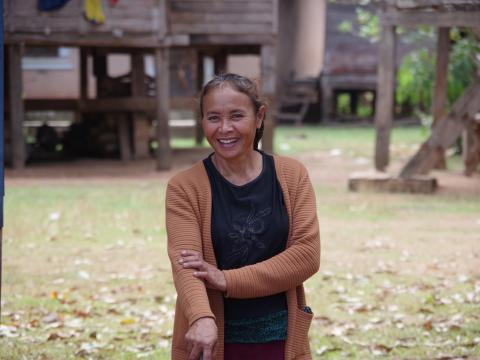A fierce smile leading the charge for women in Laos

It is never too late to become a change-maker. At age 53, Mae (translate into "Mother" in Lao language) Phaivan has become an influential voice in her community and a key driver for nutritional behaviour change in rural Southern Laos.
Without access to clean water and not enough food to eat year-round, our children can’t grow healthy and reach their full potential
says Mae Phaivan, mother of four (two daughters, two sons) and grandmother of Kopy, a 3-year-old boy.
Laos has the highest malnutrition rates in South East Asia, with 1 in 3 children under five years old being stunted (low height for age), according to a report from UNICEF in 2018. These figures increase drastically in rural areas, with 46.8% of children under five stunted in the twelve districts where the Accelerating Healthy Agriculture and Nutrition (AHAN) project started in 2018, with only 11.7% of targeted families being food-secured all year round.
Supported by the European Union and the Australian Department of Foreign Affairs and Trade, this integrated nutrition project has armed around 150 communities like Phaivan’s with knowledge and resources to defy malnutrition: climate-smart agriculture training, health system strengthening, improving access to water, sanitation, and hygiene, and building more equitable gender roles and norms within households and communities were part of the change in the making for Phaivan and her siblings.
Mae Phaivan rapidly became critical to the success of the project led by World Vision, joining key project activities like the village water and sanitation management committee (as a financial coordinator), leading the village’s Farmers group, and facilitating the Mothers’ Nutrition group, whereby she helped women in her village to learn about nutrition and health education with the support of local health workers. Her natural leadership and her strong commitment to changing her community for good led her to play a bigger role than one would expect:
I’m delighted to work in my new role and proud to have a positive impact on the children and the community of my village
“The project has brought us so many changes: water pipes directly connected to our houses, home gardens, chickens, fishes that let us eat diversified food every day, stronger sense of hygiene with toilets flourishing in every house, more peaceful relations between husbands and wives, parents and children. But most of all, I feel that now my voice counts more than ever, and it’s a special feeling.”
Led by World Vision, the AHAN Project has transformed the lives of some 140,000 individuals from 150 communities in Southern Laos.
It has greatly improved the percentage of households with food security, from 11.7% in 2019 to 70.2% in 2022. It also helped decrease the prevalence of stunting (from 46.8% in 2019 to 29.3% in 2022) and underweight (from 34% in 2019 to 29.7% in 2022) in children under five years old. The perception of women’s roles in communities has also evolved thanks to female leaders like Phaivan: now, only 15.5% of households think that men should make the final decision on how money is spent (against 36.8% in 2019), and only 12.9% of families think that men have more power in the family (against 36.8% in 2019).